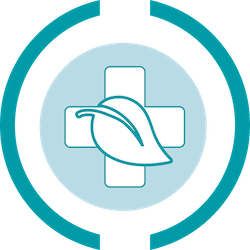
What is Naturopathic Medicine?
Naturopathic medicine provides a different lens through which to view your health concerns. It is a wellness based model of health care that aims to support people to thrive rather than just survive.
Naturopathic medicine is an integrative and holistic approach to primary health care that combines the latest scientific knowledge with traditional and natural remedies.
Utilizing a diverse set of treatment tools including clinical nutrition, IV and injection therapies, herbal medicine, and lifestyle counselling, naturopathic doctors offer personalized medicine in order to address your health concerns in the most effective way
Health vs. Disease
Rather than simply Health vs. Disease, health is viewed on a spectrum with symptoms seen as warning signs of improper functioning. Carefully selected interventions are then aimed at returning the body to optimal function—rather than just covering up the symptoms.
Naturopathic medicine provides safe and effective treatments that can address both acute and chronic issues in a minimally invasive and non-surgical way. Naturopathic therapies are backed by scientific, clinical, and traditional evidence and are aimed at supporting and restoring the body to its normal working function.

What can naturopathic medicine treat?
- Digestive health includes Irritable bowel syndrome (IBS), Small intestinal bacterial overgrowth (SIBO), Inflammatory bowel disease (IBD), and other suspected food intolerance or sensitivities.
- Women’s health including menstrual cycle symptoms, perimenopause, mental health, fertility concerns, endometriosis, polycystic ovarian syndrome (PCOS) and more
- Pain relief and management. Utilizing a combination of nutritional, supplemental, intravenous, and injection therapy approach.
- Energy and performance optimization for those wanting to feel and perform their best.
Naturopathic Care Options
Naturopathic medicine treats a wide array of health concerns across the life span—from acute to chronic and pediatric to geriatric.
Naturopathic Care
Good health underlies our ability to function optimally. Naturopathic doctors are uniquely suited to get to know each person and uncover the root of the issue. Symptoms are viewed as warning signs of improper function and rather than just managing them with medication naturopathic doctors work to identify and address the underlying cause.
IV and IM Nutrient Therapy
Intravenous (IV) Nutritional Therapy is an efficient and effective way to deliver high concentrations of nutrients directly to the bloodstream—bypassing physiological and pathological limitations of the digestive system. IV delivery can be important when absorption is compromised due to digestive issues, when nutrients have a low absorption capacity orally, and when higher blood concentrations of nutrients are desired. In addition to vitamins and minerals, amino acids, antioxidants, and botanical substances can be included in IV therapy if indicated. Every IV is prepared specifically for the unique needs of each patient.
IBS / SIBO
SIBO is a chronic bacterial infection of the small intestine and is considered to be an underlying cause of many cases of IBS. The infection involves bacteria being able to colonize the small intestine – an area of the GI tract that normally has relatively low amounts of bacteria.
Prolotherapy and Regenerative Injection Therapy
Regenerative Injection Therapy (RIT) encompasses a variety of techniques aimed at decreasing pain and improving function in the body. Prolotherapy is possibly the best-known form of RIT and targets joint instability, tendinopathy, ligament laxity, and damaged ligaments or tendons that can underlie many types of shoulder, knee, elbow, hip, foot and back pain.
Healthcare with Heart
SIX08 Health’s integrated, multidisciplinary team enables us to provide comprehensive and individualized care to our patients.

Dr. Ryan Nakama – BSC, ND
Doctor of Naturopathic Medicine
Focus Areas: Digestive health, women’s health, pain management, energy and performance optimization.
Dr. Ryan Nakama works to remove obstacles to health, including pain and mobility issues, in order to help patients obtain, maintain, or regain the life they want to live.
Dr. Nakama is skilled in the use of clinical nutrition, herbal medicine, and lifestyle counselling, with additional advanced training in prolotherapy, regenerative injection therapy, and intravenous (IV) nutritional therapy.
In addition to self-directed research Dr. Nakama regularly attends conferences and workshops in order to stay up to date on the latest research and clinical expertise in the areas of naturopathic medicine and patient care.
Naturopathic Care FAQ
Is naturopathic medicine scientific?
Naturopathic medicine utilizes the best evidence and information available to inform the diagnostic and therapeutic decision-making process. This includes scientific studies, traditional and historical evidence of use, and clinical experience.
What is Naturopathic Medicine?
Naturopathic medicine is an integrative and holistic approach to primary health care that combines the latest scientific knowledge with traditional and natural remedies.
While a person is literally made up of atoms, cells, and organs and we are much more complex than sum our parts. This means that along with medical signs and symptoms, history and lab analysis, the many other aspects of a patient’s life, including diet, lifestyle, environmental, social and spiritual factors are also taken into consideration when assessing and addressing your health concerns. Treatment options are considered without applying “alternative” or “conventional” labels. Rather, decisions are based purely on the best treatment indicated for that particular person. This allows for the development of personalized plans that can address the issues in the most effective way. Symptoms are seen as warning signs of improper functioning of the body. Rather than suppress them only to have them return, naturopathic medicine aims to address the root cause of the issue so that a return to optimal function can be reached.
Why should I see a naturopathic doctor?
Naturopathic doctors can help with:
Treating acute conditions with a natural approach. This includes cold/flu, allergies, digestive concerns etc.
Preventing and managing chronic disease. Chronic diseases such as diabetes, cardiovascular disease, and some cancers, have a significant lifestyle component. Naturopathic care can help to identify and correct risk factors at all stages.
Navigating the vast (mis)information on natural health products. From miracle cures to horror stories, the internet is full of contradictory information. Just because something is natural does not mean that it is safe and just because it’s on the internet does not make it true. What should you believe? Naturopathic doctors can help sift through the mess and find the best plan for you.
A functional and integrative approach. Naturopathic doctors aim to optimize the body’s natural functions. This includes removing obstacles to health, replacing vital nutrients and working with other health care providers including conventional medical doctors.
Optimizing health and performance. Health and disease exist on a spectrum. Naturopathic medicine doesn’t just focus on treating disease, it aims to promote optimal wellness.
Raising healthy families. The best way to treat illness and disease is to prevent it. Promoting healthy habits in children goes a long way to creating healthy adults.
More specific reasons to see a naturopathic doctor are to increase energy, assess food sensitivities, balance hormones, investigate digestive concerns, treat migraines, manage pain and injuries, relieve tight muscles.
“If you’ve been hit by a truck, go to the emergency room. If you feel like you’ve been hit by a truck, see a naturopathic doctor”.
What training and education do naturopathic doctors have?
Naturopathic doctors undergo exhaustive graduate-level training in the biomedical sciences and natural medicines. They begin their training with an undergraduate education that includes specific pre-medical prerequisites. Applicants must have a four-year bachelor’s degree and a competitive grade point average in order to be considered for naturopathic medical school.
Naturopathic medical training consists of a four-year post-graduate program. The first two years are based in basic medical sciences; anatomy, physiology, biochemistry, pathology, pharmacology etc. and are comparable to conventional medical education in both subjects and hours of training.
In addition, naturopathic students also study therapeutic modalities including clinical nutrition, botanical medicine, acupuncture, homeopathy, physical medicine, hydrotherapy, and counselling. In the 3rd and 4th years, along with advanced courses in naturopathic modalities, students undergo 1500 hours of clinical training. Students see patients under the supervision of a licensed naturopathic doctor in a family practice clinical setting.
Following graduation from an accredited school, naturopathic doctors must successfully complete the Naturopathic Physicians Licensing Examinations (NPLEx) board exams, a set of internationally standardized tests. Only graduates from schools accredited by the Council of Naturopathic Medical Education (CNME) are able to write the NPLEx exams. There are currently two accredited schools in Canada: “The Canadian College of Naturopathic Medicine (CCNM) in Ontario and the Boucher Institute of Naturopathic Medicine (BINM) in B.C.. There are five accredited schools in the United States.
How is a Naturopathic doctor different from a homeopath?
Naturopathic medicine is different and distinct from homeopathy, yet they are often confused. Homeopathy is a system of natural medicine and healing that may be part of a naturopathic doctor’s therapeutic repertoire. In contrast, a homeopath is trained only in homeopathy and does not necessarily have knowledge of biomedical medicine. Naturopathic doctors have a biomedical background and utilize a variety of treatment options in order to best match the treatment to the patient.
Naturopathic medical training consists of a four-year post-graduate program. The first two years are based in basic medical sciences; anatomy, physiology, biochemistry, pathology, pharmacology etc. and are comparable to conventional medical education in both subjects and hours of training.
In addition, naturopathic students also study therapeutic modalities including clinical nutrition, botanical medicine, acupuncture, homeopathy, physical medicine, hydrotherapy, and counselling. In the 3rd and 4th years, along with advanced courses in naturopathic modalities, students undergo 1500 hours of clinical training. Students see patients under the supervision of a licensed naturopathic doctor in a family practice clinical setting.
Following graduation from an accredited school, naturopathic doctors must successfully complete the Naturopathic Physicians Licensing Examinations (NPLEx) board exams, a set of internationally standardized tests. Only graduates from schools accredited by the Council of Naturopathic Medical Education (CNME) are able to write the NPLEx exams. There are currently two accredited schools in Canada: “The Canadian College of Naturopathic Medicine (CCNM) in Ontario and the Boucher Institute of Naturopathic Medicine (BINM) in B.C.. There are five accredited schools in the United States.
How is a naturopathic doctor different from a conventional medical doctor?
In many ways, these two professions are quite similar. The differences mainly lie in philosophy and treatment options. A medical doctor’s main treatment options include pharmaceuticals and surgical interventions. Naturopathic doctors focus on more natural and low-force interventions. They use dietary changes, supplementary nutrients, herbal medicine, and other therapies to promote healing and wellness. Philosophically, naturopathic doctors believe in treating the root cause and removing obstacles to cure. They focus on prevention and are fortunate to have sufficient time to educate and inform their patients.
Naturopathic medicine is not a replacement for conventional medical care. Rather, it provides a different lens from which to view your health concerns specifically and your health and wellness in general. Naturopathic doctors collaborate with medical doctors and other health care providers to provide complete patient care.
How is naturopathic medicine regulated in Alberta?
Naturopathic doctors in Alberta are now a regulated health profession, with associated title protection. This ensures that all Naturopathic doctors in Alberta have undergone extensive training and education at accredited institutions and are able to safely and effectively provide a high standard of patient care. In unregulated jurisdictions, unlicensed “naturopaths” may exist and it is often difficult to ensure what sort of training they may or may not have undergone.
Is naturopathic care covered by health benefits?
Naturopathic care is not covered by the Alberta provincial health care plan. However, many extended benefits plans contain full or partial coverage for treatment by naturopathic doctors. Please check with your provider to see what your plan covers.
What can naturopathic medicine treat?
-Digestive health includes Irritable bowel syndrome (IBS), Small intestinal bacterial overgrowth (SIBO), Inflammatory bowel disease (IBD), and other suspected food intolerance or sensitivities.
-Women’s health includes menstrual cycle symptoms, perimenopause, mental health, fertility concerns, endometriosis, polycystic ovarian syndrome (PCOS) and more
-Pain relief and management- Utilizing a combination of nutritional, supplemental, intravenous and injection therapy approaches.
-Energy and performance optimization to feel and perform their best.
What treatments do naturopathic doctors use?
Treatments include the use of clinical nutrition, botanical medicine, diet and lifestyle counselling and other therapies as indicated. SIX08 Health Centre also uses intravenous (IV) nutritional therapy and regenerative injection therapies/prolotherapy to provide various treatment options.
Do I continue with medications prescribed by my medical doctor if I see a naturopathic doctor?
Yes. It is not advisable to discontinue or adjust any medication dosage without consulting the prescribing doctor. Naturopathic doctors will communicate and work with your medical doctor to adjust any medications during the course of treatment. In many cases, naturopathic care can result in a reduction of the required dose of medications and minimize side effects.
What can I expect on my first visit?
The first visit is about 60–90min in which a detailed health history will be taken. This entails an in-depth investigation into your chief concerns, as well as a thorough review of other aspects of your life related to your overall health. A focused physical exam may be performed in order to further clarify the concerns and tests may be ordered if indicated. This process provides for a thorough understanding of your concerns and enables more effective treatment. A preliminary plan will then be discussed and implemented.
The second visit is typically 30min in length and involves a review of findings from the initial consultation and the implementation of a detailed treatment plan.
An intake form will be emailed to you when you book the initial appointment. Please take time to fill it out before your appointment.
How frequently do I need to see my naturopathic doctor?
As each person is unique there is no set pattern for treatment plans. The frequency of visits is largely dependent on the stage, severity and type of concerns for which you are seeing the naturopathic doctor. Response to treatment and compliance to the treatment plan will also affect the frequency of follow-up visits.
Initially, visits are often spaced more frequently as a diagnosis and treatment plan are formed. This may be anywhere from weekly to monthly. As progress and improvement are seen, visits become more spread out.
Periodic follow-ups for continued maintenance and preventative care are also encouraged. This can include plans for seasonal allergy, fall/winter immune-boosting, injury repair or prevention, travel health, and others.
Do I need a referral to see a naturopathic doctor?
No referral is necessary. Naturopathic doctors are licensed, primary care providers.

Limitless Health, Endless Possibilities.
Expert doctors and professional care. SIX08 Health aims to provide the highest standard of care in a comfortable, convenient, and modern atmosphere. Our unique, patient centered, team-based approach provides our patients with the most comprehensive and appropriate care possible.

